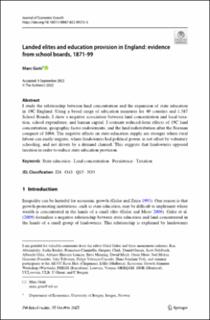| dc.contributor.author | Goni, Marc | |
| dc.date.accessioned | 2023-03-03T09:23:16Z | |
| dc.date.available | 2023-03-03T09:23:16Z | |
| dc.date.created | 2022-11-08T15:06:31Z | |
| dc.date.issued | 2022 | |
| dc.identifier.issn | 1381-4338 | |
| dc.identifier.uri | https://hdl.handle.net/11250/3055659 | |
| dc.description.abstract | I study the relationship between land concentration and the expansion of state education in 19C England. Using a broad range of education measures for 40 counties and 1,387 School Boards, I show a negative association between land concentration and local taxation, school expenditure, and human capital. I estimate reduced-form effects of 19C land concentration, geographic factor endowments, and the land redistribution after the Norman conquest of 1066. The negative effects on state-education supply are stronger where rural labour can easily migrate, where landowners had political power, is not offset by voluntary schooling, and not driven by a demand channel. This suggests that landowners opposed taxation in order to reduce state education provision. | en_US |
| dc.language.iso | eng | en_US |
| dc.publisher | Springer | en_US |
| dc.rights | Navngivelse 4.0 Internasjonal | * |
| dc.rights.uri | http://creativecommons.org/licenses/by/4.0/deed.no | * |
| dc.title | Landed elites and education provision in England: evidence from school boards, 1871‑99 | en_US |
| dc.type | Journal article | en_US |
| dc.type | Peer reviewed | en_US |
| dc.description.version | publishedVersion | en_US |
| dc.rights.holder | Copyright The Author(s) 2022 | en_US |
| cristin.ispublished | true | |
| cristin.fulltext | original | |
| cristin.qualitycode | 2 | |
| dc.identifier.doi | 10.1007/s10887-022-09215-3 | |
| dc.identifier.cristin | 2070732 | |
| dc.source.journal | Journal of Economic Growth | en_US |
| dc.identifier.citation | Journal of Economic Growth, 2022. | en_US |

